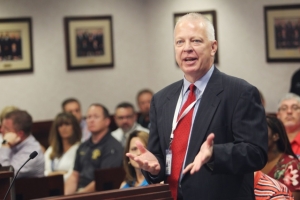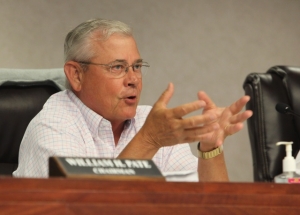No tax increase, supplements in Wayne County budget
By Steve Herring
Published in News on June 20, 2018 5:50 AM

News-Argus/STEVE HERRING
Wayne County Manager Craig Honeycutt explains the cuts made in the budget proposal, prior to commissioners unanimously adopting the approximate $190 million spending plan.

News-Argus/STEVE HERRING
Wayne County Commissioner Joe Daughtery argues in favor of a quarter-cent sales tax increase as opposed to an increase in the county property tax rate.
Just weeks after arguing the case for more local funding for teacher supplements, Wayne County commissioners Tuesday morning stripped $500,000 for that purpose from their budget in order to dodge a property tax increase.
Commissioners unanimously approved the approximate $190 million budget that keeps the property tax rate at 66.35 cents per $100 worth of appraised value during the meeting.
The budget and tax rate are effective July 1.
Many of the county's department heads were at the meeting for a budget work session, but commissioners had no questions for them.
The decision to ax the $500,000 also signaled the board's shift from eyeing a higher property tax to a new quarter-cent sales tax as a means of generating budget revenue.
Several commissioners said that a sales tax is a fairer tax since everyone pays it.
County Manager Craig Honeycutt initially recommended a 2.65-cent property tax increase for fiscal year 2018-19, citing a need to cover the loss of low-wealth school funding, additional school resource officers, an increase in teacher supplements and to ease the demand on the budget's fund balance.
A penny on the county tax rate equates to about $800,000, while a quarter-cent sales tax would generate more than $2.3 million annually.
However, the low-wealth school funding was was not only restored in the state's budget, but was increased by nearly $700,000 in recurring dollars over the current level.
Commissioner Joe Daughtery, who made the motion to approve the revised budget, said he thinks several commissioners were concerned about not being able to fund the addition to the teacher supplement.
The schools are receiving $700,000 more, plus another $154,000 in additional county funding because of a funding agreement withe county.
That is a total of more than $840,000 in additional school funding, he said.
"I would ask that we ask the school board too highly consider taking a portion of that increased funding and use it as incentives for teachers in some of our low-performing schools similar to what they have in place at Goldsboro High School," Daughtery said. "It worked. It kept those teachers there rather than moving on."
Daughtery asked Honeycutt to contact schools Superintendent Dr. Michael Dunsmore about that possibility.
It was then that commissioners began to retreat on their support of a property tax increase.
With the state funding, Honeycutt was able to remove the $800,000 from the budget.
Honeycutt said that over the past two weeks, he had heard from several commissioners who had concerns about the budget -- especially with the proposed tax increase.
"There was a concern that maybe this was not the right time to be looking at a tax increase," he said.
Honeycutt said he and his staff had reviewed things in the budget including the county's fund balance to ensure it was not being over used.
Approximately $4 million will be used in the new budget, down from $5.1 million in the current budget, he said.
In his presentation, Honeycutt said he also recommended cutting the $500,000 for a proposed one-half of a precent increase for teacher supplements; $200,000 from EMS operations; $400,000 from WayneNET; $100,000 from the Will Sullivan building renovations; and $100,000 for the Goldsboro Industrial Campus.
The cuts totaled $2.1 million, the amount that would have been raised by the proposed tax increase.
"So we are still moving forward, maybe not at the speed of what we had hoped, but still moving forward on the many different projects that the board looked at as priorities," Honeycutt said.
Commissioner John Bell told his fellow board members that he was going to be watching their spending next year.
"You can't spend like you have plenty of money and come up and say that we do not want a tax increase," Bell said. "You have either got to not spend too much and then you won't have to have a tax increase.
"We are going to have to cut spending or we are going to be in the shape next year."
The changes do not affect what the budget had set aside for county employees, including a 1 percent salary increase and additional possible 1-percent merit pay increases, he said.
The budget includes several other increases and the addition of an inspection department insulation permit fee of $50 and a new specialty care transport fee of $1,063.55 for WayneNET -- the county's non-emergency transport service.
WayneNET is also increasing its advanced life support system non-emergency fee from $335.37 to $392.70 and its basic life support non-emergency fee from $279.49 to $327.24.
Wayne County EMS is increasing its advanced life support level 2 comprehensive transport fee from $768.57 to $899.93, its advanced life support emergency fee from $531.01 to $621.77 and its basic life support emergency fee from $447.17 to $523.59.
The fees for both departments are billable in half-hour increments.
The board has until Aug. 3 to instruct the Wayne County Board of Elections to include the sales tax referendum on the Nov. 6 ballot.
Daughtery said the vote would have to be marketed, and Commissioner Ray Mayo said that the revenues be earmarked for schools.
Commissioners can indicate that the money be used for a specific purpose such as education, County Attorney Borden Parker said.
However, the wording that would be on the ballot is prescribed by the state and would not include a specific purpose for the tax, he said.
The tax would be levied on items on which sales tax is already paid, Honeycutt said. It would not apply to food, he said.
For each $100 of taxable goods purchased, a person would pay an additional 25 cents, Honeycutt said.
